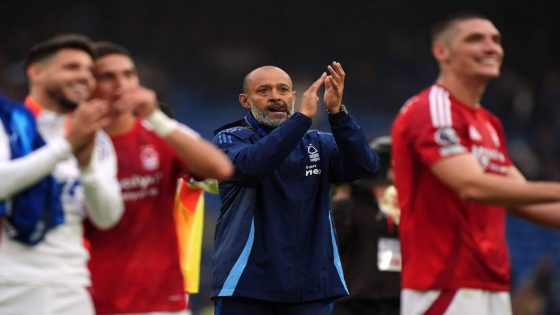The last time Nottingham Forest collected 28 points after 16 games in the Premier League, the world’s first smartphone had just gone on sale in 1994.
So if you are looking at the top-flight table, possibly via a smartphone, and are baffled to see Forest in fourth place, you could be forgiven.
The inconsistency of teams in the 2024-25 Premier League season might have helped, but Forest’s seat in the Champions League qualification spots isn’t a fluke. Under Nuno Espirito Santo, Forest have been very impressive, consistently performing, and winning away to Liverpool and Manchester United this season.
The base of their success has been defensive improvement. “We are stronger as a team this season,” said Nuno before facing Chelsea in October. “We have been able to press much better, in higher parts of the pitch. We have defended the box well. That it is not about the individual. As a team, we can cover more space.
“Since the end of last season, the commitment was to improve on that aspect. There is no way to play in the Premier League if you are not solid, compact and strong in defence. The team is doing well defensively, basically because of the hard work of the players, their resilience and their commitment to put their body in front of the ball.”
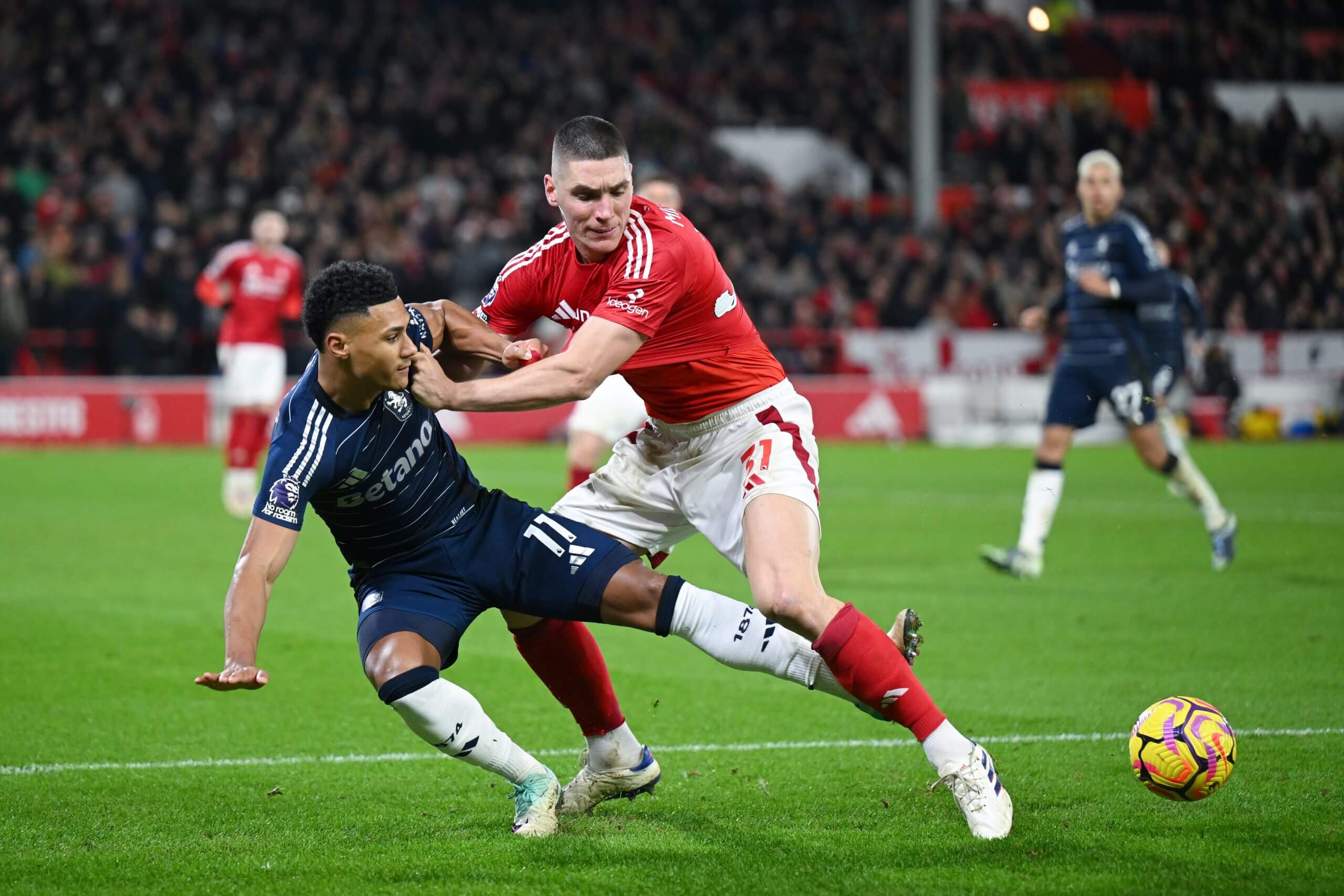
The arrival of Nikola Milenkovic in the summer has strengthened the defensive line, and consistent selection in the back four has helped. Yet, as Nuno explained, it’s a team effort.
That collective performance without the ball has limited goals conceded by Forest to 19 in the Premier League this season. Only Arsenal (15) and Liverpool (13) have conceded fewer goals. Bottom club Southampton have conceded 36, while second-bottom Wolverhampton Wanderers have conceded the most, with 40.
A team effort is also reflected in Nuno’s side conceding the third-lowest non-penalty expected goals (xG) per game in the league (1.1), again after Liverpool and Arsenal.
On top of that, the average quality of shots they have been facing isn’t that high. Forest’s 0.08 non-penalty xG conceded per shot has been the best rate in the Premier League this season, with only Arsenal matching that number.
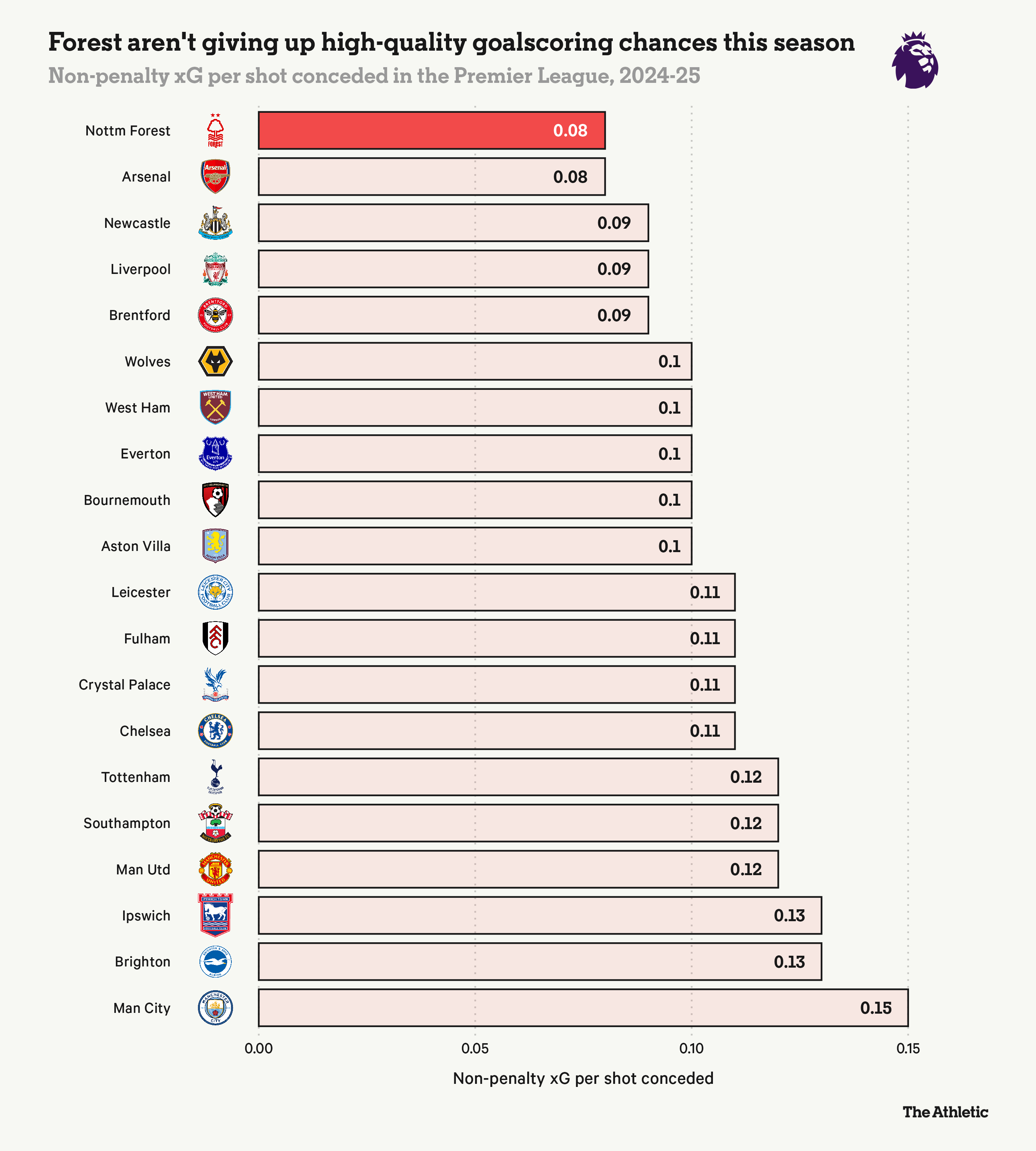
Nuno’s use of his bench and tactical adjustments throughout the game plays an important role in Forest’s defensive performances. One of his most common tweaks this season is bringing on Morato and moving to a back five when seeing out a lead.
Being proactive with substitutions has benefited Forest offensively and defensively. In terms of the average timing of substitutions in the Premier League this season — discounting enforced substitutions for injuries — Nuno has been making his changes earlier than most coaches.

Defensive set pieces are an area where Forest were suffering last season. In 2023-24, they conceded the most goals from set pieces (23) in the Premier League. For comparison, Manchester City conceded the fewest (3).
When adjusting for equal opportunity, the numbers didn’t pick up. Looking at goals conceded per 100 set pieces in the Premier League last season — which creates a fair and level playing field across all 20 teams, as one team might face more set-piece opportunities than another — Forest’s rate of 6.6 was the worst in the league. Again City had the best (1.7).
It was an area that the team had to strengthen, and things have changed this season with Forest successfully limiting the average quality of chances they are facing from dead-ball situations. Therefore, it isn’t a surprise that they have only conceded twice from set pieces so far in the Premier League.
Their rate of 1.6 goals conceded per 100 set pieces is the third-best in the league after Ipswich Town and Brentford.
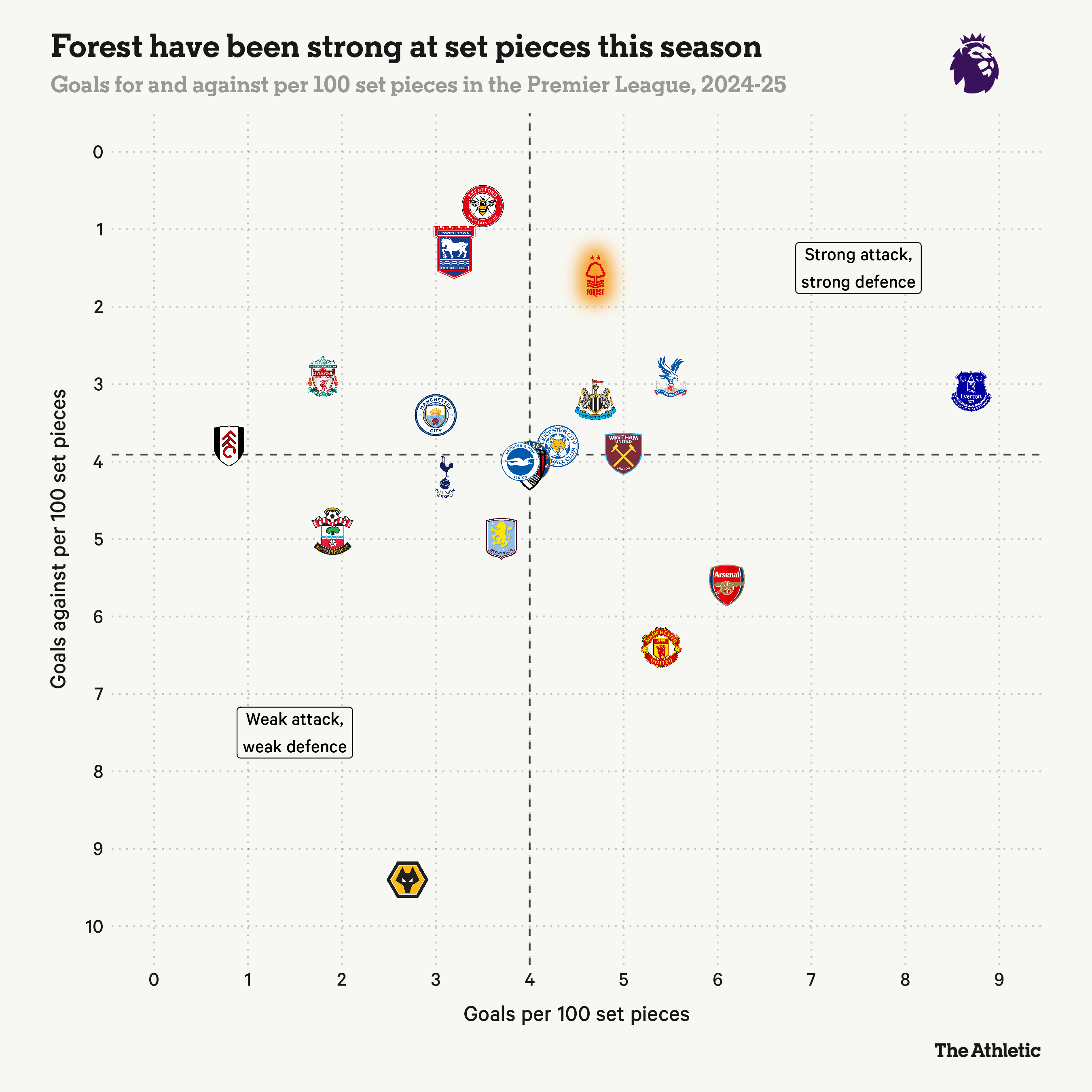
At the other end, their attacking set pieces have improved as well — Milenkovic’s aerial presence and Elliot Anderson’s delivery have been useful additions.
Their goals scored per 100 set pieces in the Premier League has jumped from a rate of 2.5 in 2023-24 to 4.7 this season — the sixth-highest rate in the league.
In addition to set pieces, Forest have been lethal when they win the ball high up the pitch with space to attack. The pace and dribbling of Callum Hudson-Odoi and Anthony Elanga on the transition coupled with Morgan Gibbs-White’s creativity makes them a threat in such situations.
Hudson-Odoi’s winner against Liverpool is an example of how dangerous Forest have been on the break, and Gibbs-White’s goal at Old Trafford is another that shows how they seize the opportunity quickly when they win the ball higher up the pitch.
Looking at Forest’s possession regains in the attacking 60 per cent of the pitch in the Premier League this season, 10.6 per cent have ended with a shot within 10 seconds of retrieving the ball — a higher share than three-quarters of the league. This highlights how Forest have been using attacking transitions to quickly generate goalscoring opportunities.
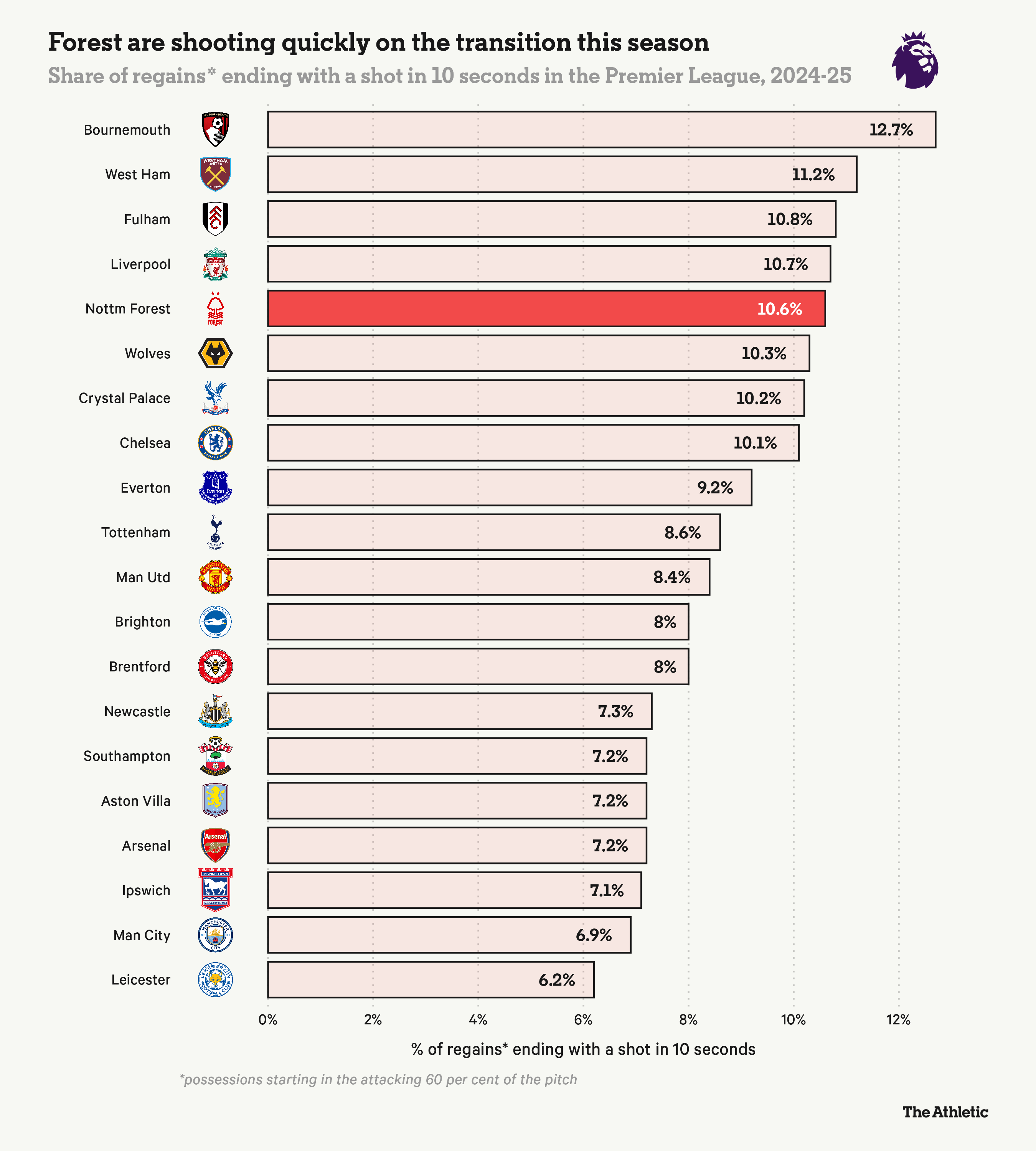
Despite there being room for improvement in open play to create higher-quality chances and reduce the dependency on Chris Wood’s brilliant form, Forest have been playing like a team with a clear identity.
Having a pre-season has helped Nuno instil his principles and work on the things he wanted to. “I think we achieved something that already can identify us as a team,” Nuno told Sky Sports earlier this month. “We are hard to beat, we are compact, we try to be solid. All these things that we tried to build and the players to believe (in), I think it’s already there.”
Thirty years after their last equally impressive start in a Premier League campaign, Forest may have their eye on matching the third-place finish they achieved back then.
(Top photo: Nuno Espirito Santo by Bradley Collyer/PA Images via Getty Images)
